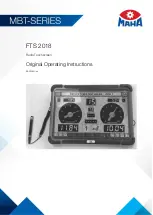
ENGLISH
9
Fig. K
Keep hands and fingers clear of pinch
point area between spanner and
reaction roller. See Fig J.
Keep hands and fingers clear of pinch
point area between pipe flange and
reaction roller. See Fig J.
•
Repeat previous steps as required
until nut (bolt) is tightened to the
proper torque.
Notes:
Spanner must be repositioned
after each wrench cycle by operating
the pump in the
Retract
direction. The
tool contains no spring return.
4.3.2 To loosen a nut or bolt (fig. K, L)
•
Apply penetrating oil to the threads.
Allow the oil to soak.
•
Reinstall the positioning handle on
counter-clockwise (-) side of wrench.
•
To loosen the nut (bolt), follow steps
in section 4.3.1, but with the counter-
clockwise (-) side of wrench facing
upward.
•
Repeat steps until nut (bolt) is loose.
If the nut or bolt will be re-used avoid
excess load when loosening.
-
Be aware that when loosening a nut
or bolt more torque is usually required
than when tightening.
-
Humidity corrosion (rust) requires
up to twice the torque required for
tightening.
-
Sea water and chemical corrosion
requires up to two and a half times
the torque required for tightening.
-
Heat corrosion requires up to
three times the torque required for
tightening.
Be aware that when loosening a nut
or bolt shock loading can occur. Do
not apply more than 75% of the
wrench’s maximum torque when
loosening nuts or bolts.
Fig. L
Fig. J
PINCH POINT
HAZARD
Summary of Contents for WCR4000
Page 1: ...Instruction Sheet WCR4000 Roller Cassette L4021 English GB Rev B 09 2013...
Page 2: ...2...
Page 17: ...17 NOTES...
Page 18: ...18 NOTES...
Page 19: ...19 NOTES...






































